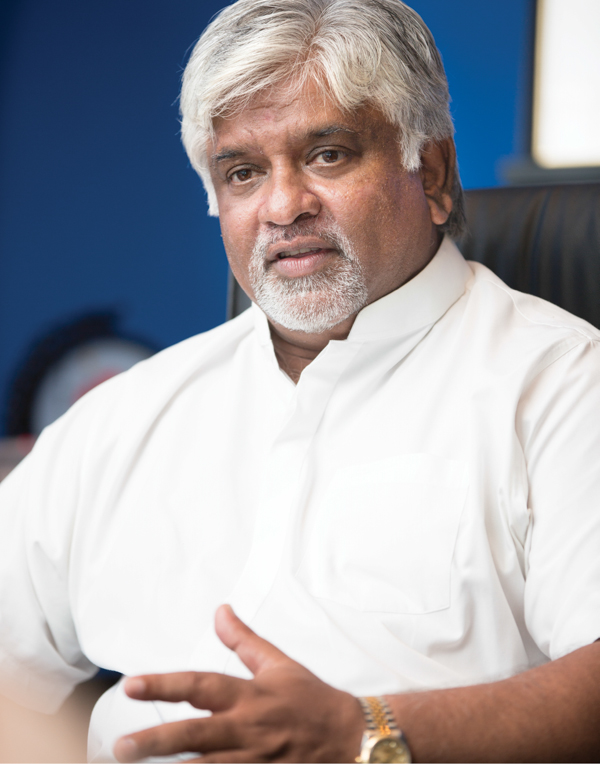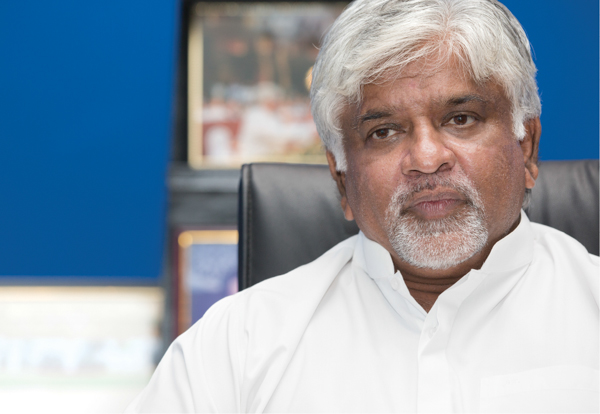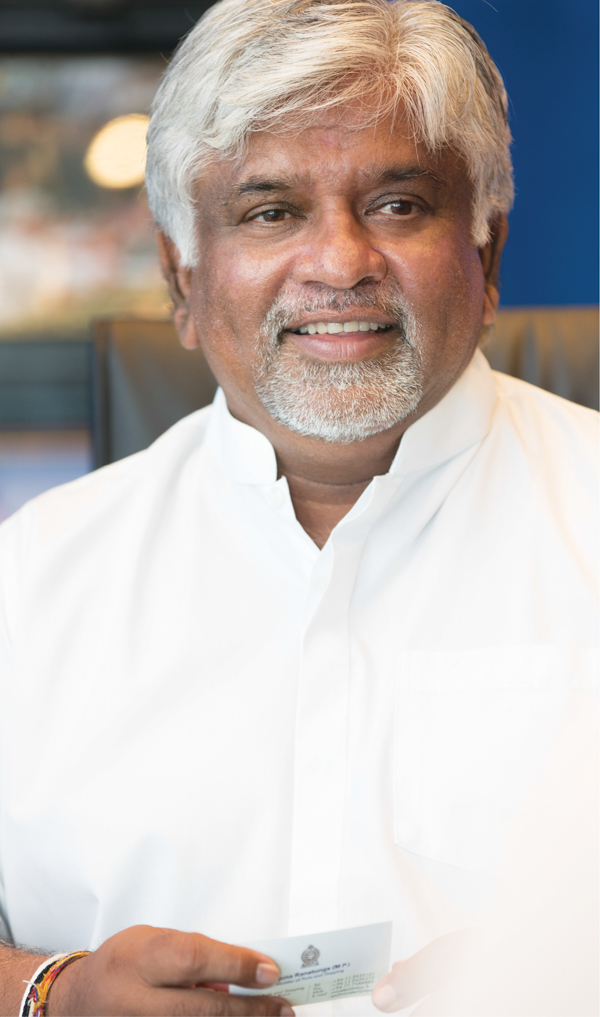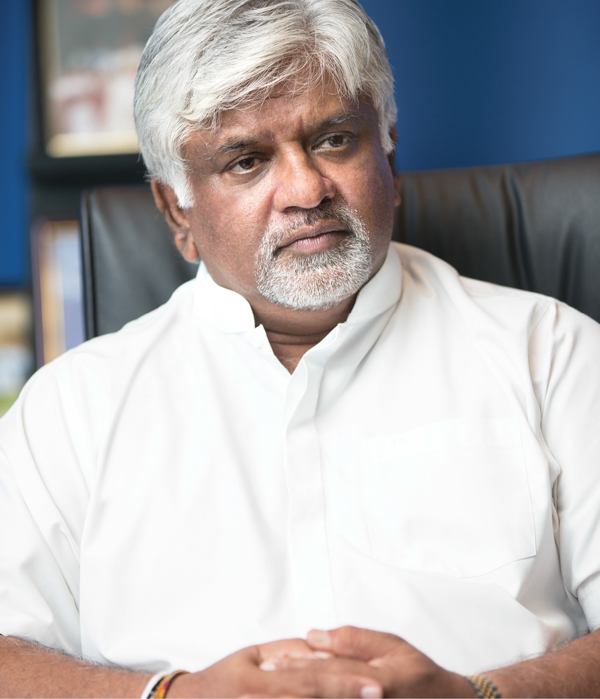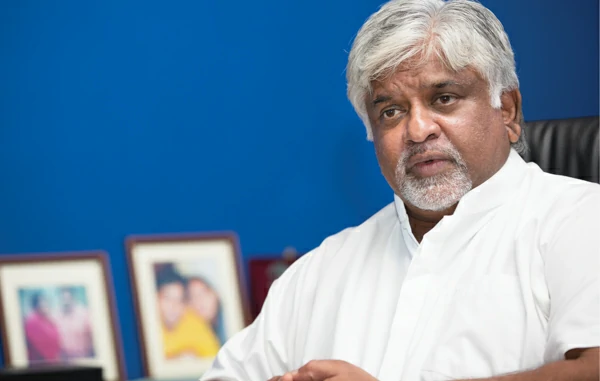
As a nation, we love him as the captain of the Sri Lankan World Cup winning cricket team. Although 20 years have passed since that victory, no other captain has yet been able to achieve the same. We know him as a person who stands firm both for what he believes in and what he feels is best to safeguard the integrity of this country. We have seen that on the field and now with his advent as a politician following his retirement from cricket in 2001, we see the same strength and character of a leader who stays true to his principles and does not hesitate to voice his opinion. Arjuna Ranatunga, the Minister of Ports and Shipping of the incumbent government, shares his story of what makes him who he is – a born fighter.
By Udeshi Amarasinghe | Photography Mahesh Bandara and Isuru Upeksha
Who is Arjuna Ranatunga?
That is a difficult question to answer. I am a person who loves the country and wants to work for the country. Even as a cricketer, my ambition was to take Sri Lanka to a different level. I was very lucky that I was able to achieve that with a committed team of 13 cricketers when we won the cricket World Cup 20 years ago.
As a politician, I am totally against corruption. I know that it is not an easy task to clean up an institution such as Ports, but I have a vision and determination that I will be able to achieve that one day. I entered politics following my retirement from cricket because I felt that I could give something back to the country by looking at the needs of the people and assisting them in my capacity. I wanted to see whether I could be a part of their lives. That is the reason I entered politics and it has been a long journey.
If I turn back and look at my life I feel that I have done enough as a cricketer but as a politician, I am really struggling to get things right in this country.
We all know you as a cricketer and the captain of the World Cup winning team. Can you tell us how cricket has made you who you are today?
I feel that all the cricketers who play for this country are blessed and lucky that we could play cricket. Out of 20 million people, we were selected to represent the country. I always give credit to my parents firstly for what I have achieved in life and then cricket.
Cricket has given me enough; it is not the money because I never went after that but the happiness and sense of achievement. Even in my political life, cricket has been a massive advantage for me to get close to the people. When I analyse all these things, the game has given me a great advantage.
When you look at cricketers during your time and those who have come after you, you are one of the very few in the world who has not made money out of cricket. Why is that?
I always prefer quality and not quantity. I was only 18 years old when I played my first Test match for the country. At that time, Michael de Soysa, who helped me with my cricket and also to get into SSC, came with a commercial offer soon after the first Test match. I was living with my parents, so I asked Michael to speak to my mother, as she was the decision-maker. Michael came round, had a cup of tea and explained to my mother who listened for about half an hour and then she said, “Thank you very much, Michael, but my son is not for sale!” I can still hear that. And on the same night when I was sleeping, she sat next to me, and she told me, “Don’t ever sell your body or your talent to earn money.” My father gave me another piece of advice and that was, “Don’t live to earn money. With whatever money you get, you should know how to live.” These are the defining lessons that have helped throughout my life.
“Thank You Very Much, But My Son Is Not For Sale!” I Can Still Hear That. And On The Same Night When I Was Sleeping, She Sat Next To Me, And She Told Me, “Don’t Ever Sell Your Body Or Your Talent To Earn Money.” My Father Gave Me Another Piece Of Advice And That Was, “Don’t Live To Earn Money.”
I did do a couple of advertisements to raise money for charities; one such campaign was to purchase an MRI scanner for the National Hospital. Then we did a polio advertisement. But I did all of that for charity. I was offered many attractive packages and after winning the World Cup, my mother said that since I have my own children, I should do what I feel best for them. I always tell her that if she can look at my face and tell me to do a commercial for personal gain, then I will do it. And, she can’t. Keeping my mother happy is one of the most difficult things to do but with this I keep her happy.
Today, we see many cricketers playing for money such as the IPL and T20. You did not play for money, even internationally. Why is that?
I do some coaching overseas but have not got involved in any commercial endeavours. A few years ago the World Cup winning captains took part in a campaign called Keep Cricket Clean. This was in response to issues that arose with match fixing and other problems that had infiltrated the game. It was dragging into the system. The captains got together and did a massive campaign, which helped to a certain level. We collected funds to educate schoolchildren on the principles. That was one of the best projects that I was a part of. I worked with Clive Lloyd who was the first World Cup winning captain and Steve Waugh who was the last World Cup winning captain, I was in between with Imran, Kapil and Allan Border and it gave us great happiness and a sense of achievement once again.
What are your thoughts about cricket in Sri Lanka today?
To be honest, I am very disappointed with the things happening now. Political interference continues even today; this has not changed. This is one reason that I was trying to get into the cricket board so that I could give something back. I know that it is a very difficult task to contest, considering the amount of money each person spends. I felt that if we come in as a cricketers’ group, we could achieve something again. I know I am very busy with ministerial commitments but I felt that I should sacrifice at least one day of the week for cricket. That is the reason that I was trying to get involved, but the system is too corrupt. I tried to enter the cricket board as vice-president, not as president, and I feel very sorry because I can see the talent in this country and I do not think that even one tenth of the talent is identified.
I wanted to focus on school cricket because I felt that if I am able to handle school cricket for two years then we can train the cricketers properly in terms of principles and technique. I wanted to get a group of past cricketers involved, people who are not looking for money or positions to help cricket in the country: that was the target. But it is unfortunate that I am not there on the board.
It has been 20 years since Sri Lanka won the World Cup. Why haven’t we been able to achieve this again?
I still feel that we could have won both World Cup finals but you need to have luck as well. You need commitment and that is why I am grateful that I had 13 members so committed to playing cricket and to winning the game. That is the only plan that we had. We never focused on anything else. We were focused on each game, and while we analysed cricketers and discussed things outside, when we were on the cricket ground we were very focused on what we were doing and what we could achieve. That is something I did not see the last two times Sri Lanka entered the finals. The team needs proper guidance and I did not see that.
I still feel that we are a very talented cricketing nation. Recently, I was invited to Jaffna to watch the big match. More than 500 people, many of them my friends, came from overseas to watch the big match. My request to them is to come and help to develop the North. I was at the match only for a few hours but the amount of talent I saw was unexpected. There was a superb fast bowler and batsman. This is an area that was neglected for 30 years; therefore, within five years, for someone to play so well, it is not only the coaching but it is their talent. That is why I feel that if we can identify the talent then we can get cricket into a very high level. I can be the Minister for Ports but when it comes to sports development, I will come and help any time.
I Am Grateful That I Had 13 Members So Committed To Playing Cricket And To Winning The Game. That Is The Only Plan That We Had. We Never Focused On Anything Else.
Even today we had about 20 cricketers from Jaffna for a training camp. They are going to stay and train with some school cricketers from the Gampaha district. They will have meals together and interact with each other. We want these children to take a positive message to their parents. We are planning to get cricketers from the North and East to work with cricketers in the South. Though this should be done by the government, we are doing this with a different approach.
We went to Jaffna a month ago as well and at that time we did one-day coaching, not only in cricket but also other sports such as volleyball, netball, football and badminton. We had about 100 children, and in Trincomalee, we had 250 children. I do such programmes at least once a month.
Why did you enter politics?
I was dragged into politics. I was invited by former President Chandrika Kumaratunga through my brother and a few other politicians to enter politics. Out of my family, I was the last person who wanted to get into politics. President Kumaratunga was able to convince me because she knew how to get me interested; she started talking about sports. She said that I had done a lot for the country and I can continue to do that through politics and take sports to the entire country. That was my ambition but it was unfortunate that I never got the sports ministry in my life. This time the President and the Prime Minister asked me whether I wanted the portfolio but I rejected it because I feel that I am too old to take that ministry.
I was the Deputy Minister for Tourism for a short period of time and I had the privilege of working for Mr Anura Bandaranaike, who was the Minister for Tourism, Investment Promotion and Industries. He was one of the very few honest ministers that I had met and he allowed us to work. That is something I follow today at the Ministry of Ports and Shipping. Then, when President Chandrika Kumaratunga left the Party, I supported former Presidents Mahinda Rajapaksa as the Party leader and I entered Parliament again. I was appointed as the Deputy Minister for Tourism with Mr Bandaranaike again and then Dr Sarath Amunugama became my minister. I have been lucky because even when I was a deputy minister, my ministers were very good. They allowed us to work and they were not corrupt, and when you have that, you can work.
I Am Very Close To The President And Prime Minister. It Is A Great Experience To Work With The Two Of Them. They Are Very Honest And Easy To Work With.
I soon realized that I was not comfortable with the system and I had a lot of discussion with Mr Rajapaksa. I knew that I was not happy with some of the things happening and I resigned from my portfolio and became only a Member of Parliament. I never shifted till the war was over. I felt that I had to be part of the group that supported the war. As soon as the war was over and General Fonseka decided to contest, he invited me to support him. I felt that with the contribution he made for this country that I must give something back to him and worked with him to try and form a government.
I was part of the main group that supported Maithripala Sirisena as the Presidential candidate. We were able to change the Rajapaksa regime, which no one thought possible. The biggest achievement was that President Maithripala was able to get everyone together without signing a single document. We never signed any agreements, whether it was a party from the North or East or Central. We had complete trust in him. We were able to achieve this victory as a group. After that we formed an alliance to win the Gampaha district.
I am very close to the President and Prime Minister. It is a great experience to work with two of them. They are very honest and easy to work with. The President is different to the Prime Minister and both manage different areas of governance. We can learn a lot of things from both leaders. Working with the President and the Prime Minister during the last couple of months has brought me great happiness. During Cabinet meetings we can criticize and argue to give our perspective, which I never had the opportunity to do. I first attended Cabinet meetings as a Deputy Minister, but we did not even get an opportunity to give a presentation during the previous regime. If the Prime Minister brings something and if I feel that it is not good enough, I can criticize that too. If the President brings something, we can criticize that. This is something that I personally like in the Cabinet. When any of the ministers present, we can give our opinion and discuss so that we make the right decision for the country. Everything is very transparent and we work very closely with each other. In my political career, I am so honoured to work with these two leaders.
I am 52 years old now and I still feel that I am very young in the Cabinet. There are younger ministers in terms of age but I still feel with the experience that the President and the Prime Minister have, we are like amateurs. When they speak and present policies, there is so much that we can learn. I go through all the Cabinet papers because I learn from these things. That is why I say that I am so happy – whatever the issue we face, we can be very transparent with these leaders.
You are known as a politician always standing for what you believe in, and never wavering. That is a very difficult task. How are you able to do this?
That is something my parents have given me. I look at my father as a politician; he was one of the most honest and clean politicians that I have come across. I was told by my parents, teachers and school to do the right thing. I think everyone is taught that. But I feel that I am a person who takes decisions thinking of the country and not thinking about myself.
I am a person who does not look at a party; I look at leaders. Honest leaders should govern this country. Whenever I see an honest leader, I work closely with them and assist them to get them to the top. That is the happiness and satisfaction that I get. This is not an easy task. I know that – I have resigned four times in my life.People will say that it is easy to resign and wash your hands but with some of the issues that I went through with the previous government, I felt that I could stay and fight alone but that would not work. I had to make the decision to step down without fighting with them directly. I personally feel that when you are in a group or party, you cannot discriminate the party or criticize the party. You go out and then you can criticize the government. When you are part of the government, you have to be very careful. It is not fair to criticize when you are a part of it. I do not criticize anyone with someone else. If I have a problem with the President or Prime Minister, I go and meet them and discuss the problem with them. Any minister I criticize I first discuss with them and if it doesn’t happen then sometimes I will criticize them in public.
I Am A Person Who Does Not Look At A Party; I Look At Leaders. Honest Leaders Should Govern This Country. Whenever I See An Honest Leader, I Work Closely With Them And Assist Them To Get Them To The Top.
You have represented Colombo, Kalutara and now Gampaha district. What can you tell us about these electorates?
I started with Colombo with the UPFA. Then I shifted to Kalutara because General Fonseka was contesting in Colombo. I felt that both of us should not contest from the same district so I shifted to Kalutara to contest from the Democratic Party.
I enjoyed working in Kalutara where I developed religious places and schools. I dedicated funds into developing religious places and looking after the priests, which has helped me to get into a different level.
During the last election, I came to Gampaha to contest from the UNF. We formed an alliance with the UNP and my target was to win the Gampaha district. The biggest challenge was my younger brother, Prasanna. Generally, when you analyse Gampaha, it is a left SLFP-based district but we felt that we could win the district.
Minister John Amaratunga and I worked as a team. We targeted different areas; Mr John Amaratunga was focused on the coastal line and I targeted the interior. We worked as a good unit so that the UNF could win the district. That was one of our biggest achievements.
You were able to win from a district that had been developed greatly by the previous government. How was this achieved?
We started with the Presidential elections. Former President Kumaratunga and I analysed the Gampaha district for Maithripala Sirisena’s candidacy. At that time, we felt that we were going to lose by about 50,000 to 100,000 votes but when the campaign progressed, we knew that the margin had got closer and we were going to lose by around 25 to 30,000. We travelled all around Gampaha. Attanagalle generally wins by around 30 to 35,000 votes but we were able to bring it down to 2,500. Minuwangoda, which is my brother’s electorate and him being a chief minister for such a long time and generally winning by about 25,000, was brought down to 3,000. We saw that people were looking for a change.
My Target Is To Try And Clean This Organization. Ports Is One Of The Most Corrupt Organizations In The Country… I Am A Born Fighter And I Am Cleaning Up This Mess And I Feel That More Than 60 Per Cent Of Corruption Has Been Stopped In The Port. That Is A Huge Achievement.
Then with the general election where we had to contest from the UNF, the other side was targeting me, saying UNP. But that didn’t matter because I trust Mr Wickremesinghe and have great respect for him. We were trying to form a national government whoever wins, but if the other party wins then there would have been an issue. Therefore, we decided to work as a group with the UNP. Once again we won with a very big margin. I am not trying to take the credit but during this election the SLFP votes were divided, of which some came to me. Then, the Ranantunga votes were divided. It was very unfortunate that my younger brother did not win, if not for the fact that for the first time in history, three brothers would have entered parliament together.
You are the Minister of Ports and Shipping. This is a very important sector of this country. Can you tell us your plans and what progress has been made so far?
My target is to try and clean this organization. This is one of the most corrupt organizations in the country. When I took over and saw the loans that we have, I knew that this was not an easy task that I had taken. I am a born fighter and I am cleaning up this mess and I feel that more than 60 per cent of corruption has been stopped in the port. That is a huge achievement.
There are many things to be done. We have plans to develop ports in the East, and we are looking at an investor to come and operate there. Then we are looking at Hambantota where we need to work with the Chinese and get the industries moving and operationalise some of the contracts that we have signed. We are trying to develop Galle as a tourist destination; we are looking at Trincomalee as a heavy industry area and KKS as a transport and ferry point between Sri Lanka and India.
These are the plans and there will be a call for tender for the East, next month. Everything will be transparent. The ADB is our partner with the east terminal and they are advising us. Whatever we do at the Ports, it is very transparent now, even though some top officials are not happy because they are used to a different system in the past. It is not an easy task to change their minds and attitudes and since they were receiving additional money they were used to a different life. When you try to change all of that, it is not a very comfortable thing to do but things are falling into place and working pretty well at the Ports now.
Future plans?
In terms of the Ports, getting the right people to work with for the East terminal is a priority. Then, making Hambantota a feasible venture as well as reducing costs is the main area we are looking at. We are trying to see whether we can develop Galle as a tourism base and these are some of the basic future plans.
Think Of The Country First And Then Think Of Yourself And The Party. If We Can Have This For The Next Four Years, We Will Be Able To Create A Different Country For Our Children.
As far as I am concerned, during the next four years, the government wants to take the country to a different level. That is the plan of the President and the Prime Minister. We are there to support them. If we can stop corruption in this country and get the proper funding and resources that the government requires, then it will not be difficult to run this country. But this is not an easy task. I know how I suffer with Ports and I cannot imagine what the President and the Prime Minister are going through. They have to look into so many issues, such as problems with ministers, debt that we repay, international relations and certain things that have happened in the past that even we do not know. There are many things underway. It is not an easy task we go through. But I know with the President and the Prime Minister, with their vision, we can push this country in a different direction. That is the only ambition I have for now.
Final thoughts?
This government needs to show the people that we are different. It cannot be done with only the President and the Prime Minister and a few of us. It has to be done by the entire group. This is the first time in the history of the country that a national government has been formed with the SLFP and the UNP working together to solve the problems that have arisen during the last few years, and if we can get answers to these, then we can do our own politics one day. But I look at things differently. I am part of the SLFP and we were brought up with the Bandaranaike concepts. Ultimately, when it comes to the country, you have to think of the country while pushing out your interests in the parties. That is what we have done. Take the Prime Minister – he is the head of the UNP but supports SLFPers in the government, then the President, who is the leader of the SLFP but supports UNPers in the government and the parliament. These are the things that I have learnt from these two leaders. This is something that we need to have in the entire system. Think of the country first and then think of yourself and the party. If we can have this concept for the next four years, we will be able to create a different country for our children.
